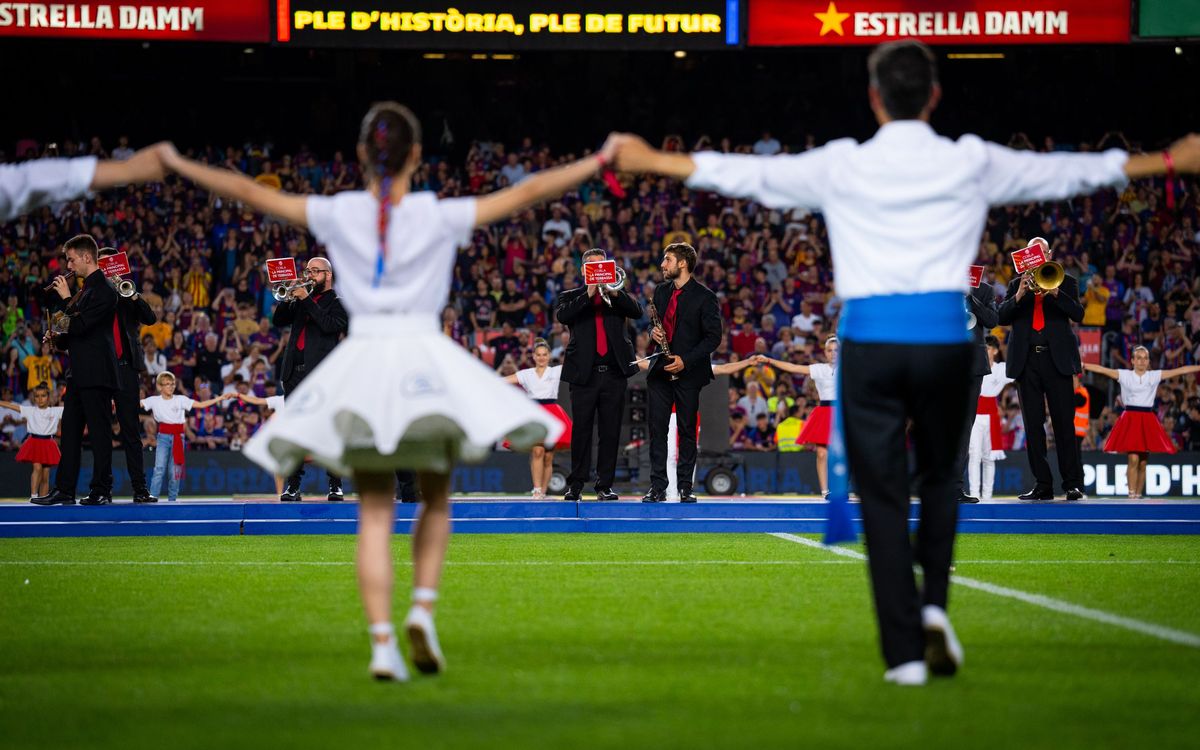Similarities and differences between first and last games at Spotify Camp Nou
- label.aria.viber Viber
- label.aria.whatsapp WhatsApp
- label.aria.twitter Twitter
- label.aria.facebook Facebook
- label.aria.messenger Messenger
- label.aria.link label.aria.tick Copy link
The first time is always special, they say. And so is the last. And this never held so true for FC Barcelona fans as the first and last games to ever be played at Spotify Camp Nou. Last Sunday's 3-0 defeat of Mallorca was the final game before the team moves to its provisional home on Montjuïc, almost 66 years on from the game against a Warsaw XI on 24 September1957, the first ever in the stadium.

We thought it would be fun to compare the differences between those two very special days.
Unfinished stadium and another being demolished
The original pitch measured 107x72 metres, but it would eventually be downsized to 105x68.
And the first ever game was played in a stadium that wasn't actually 100% complete at the time, although there was very little left to be done. And the final game was also played before a not entirely complete stadium, for the third tier behind the South Goal has already been demolished ready for the construction process to begin in earnest this Monday.
The game in 1957 kicked off at 4.30pm local time, while the final whistle on Sunday blew at 8.52pm, somewhat later in the day.
From Balmanya to Xavi and Eulogio to Gavi
Domingo Balmanya was the coach back in 1957, and his team featured Ramallets, Olivella, Brugué, Segarra, Vergés, Gensana, Basora, Villaverde, Martínez, Kubala and Tejada.
23,987 days later, Xavi Hernández picked an XI consisting of Ter Stegen, Balde, Christensen, Kounde, Jordi Alba, Sergio Busquets, Gavi, De Jong, Dembélé, Lewandowski and Ansu Fati.
The first captain at a stadium that didn't officially have a name at the time was Joan Segarra. The last was Sergio Busquets, although strictly speaking he came off for the last few minutes, meaning that the honour actually should go to Sergi Roberto.
Both games ended in wins. Barça beat the Poles 4-2, and also beat the Balearic Islanders 3-0.
The first ever goal was scored by the Paraguayan Eulogio Martínez, finishing off a tasty move down the left. And the last goal to be scored in the stadium was a veritable thunderbolt from Gavi, nabbing the honour from his team-mate Ansu Fati, who had scored the first two goals of the evening.
Posts and Poles
Curiously, Edward Jankowski, a Gornik Zabrze striker on the visiting team on 1957, was the very first player to hit the woodwork, and a fellow countryman of his many years later, Robert Lewandowski, would be the last to do that when he sent a free kick onto the post in the 67th minute of the game with Mallorca.
Ovations for legends
And both days included ovations for very special players. As the Revista Barça of the time says, there was a standing ovation for the great Hungarian Kubala when he came off after a fine performance to be replaced by Evaristo. And not one but two players were given the greatest of honours at Spotify Camp Nou on Sunday, as both Sergio Busquets and Jordi Alba both played their very last home games for the club before departing.

Fans and tradition
There were 93,503 people in the stadium for the opening fixture, compared to 88,775 for the last. But both sets of fans were treated to the same traditional sardana dance, a staple of such occasions in Catalonia then as it still is now.
On the opening day it was at half-time that 1,500 led by the Agrupació Cultural Folclórica de Barcelona performed the dance and set free 10,000 white doves. The club couldn't not repeat the performance, with the Cobla Principal de Terrassa leading the way this time in a sardana held after the game had finished in one of the very last acts inside the beloved stadium.

- label.aria.viber Viber
- label.aria.whatsapp WhatsApp
- label.aria.twitter Twitter
- label.aria.facebook Facebook
- label.aria.messenger Messenger
- label.aria.link label.aria.tick Copy link

